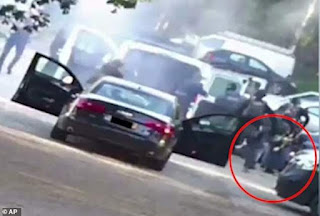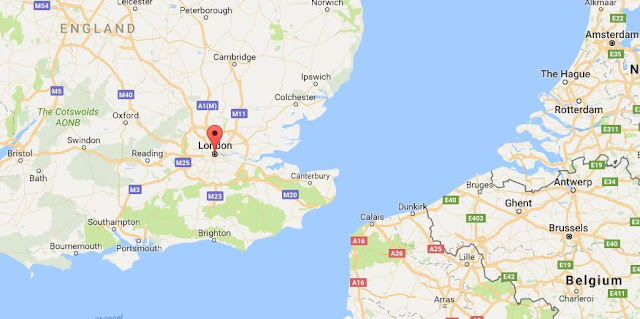Corruption is Everywhere - and I mean Everywhere in Mexico
Jonathon Gatehouse · CBC News
Mexican marines surround the Secretary of Public Security of Acapulco, Max Lorenzo Sedano, right, on Tuesday.
Mexican military forces arrested police officers and took control of the local Public Security Secretariat,
citing possible infiltration by organized crime. (Francisco Robles/AFP/Getty Images)
Surging crime in Mexico
Mexican authorities have disarmed and suspended Acapulco's entire municipal police force amidst a massive murder and corruption investigation.
Heavily armed soldiers and marines staged a daylight raid on the resort city's police headquarters yesterday, arresting two senior police commanders on homicide charges and seizing the guns, bulletproof vests and radios of the rest of the force.
Mexican Marines escort Acapulco municipal police officers who were disarmed and detained Tuesday
during an operation to check if they were colluding with organized crime. (Javier Verdin/Reuters)
The Guerrero state government issued a statement saying it will be taking over policing responsibilities in the city "because of suspicion that the force had probably been infiltrated by criminal groups" and "the complete inaction of the municipal police in fighting the crime wave."
The Pacific coast city of 800,000, once a playground for foreign tourists, is now known as Mexico's murder capital. The local murder rate is 103 homicides per 100,000 residents, one of the highest in the world.
Most of the killings are connected to the drug trade, with up to 50 gangs currently battling for supremacy.
Drug violence in Mexico has left more than 200,000 dead since 2006. Another 35,000 people have simply disappeared.
A relative of a missing person enters a site on Sept. 17 where a mass grave was found in El Arbolillo, Veracruz.
The region has been hit by bloody drug cartel turf wars, and scores of bodies have been found in
33 mass graves at El Arbolillo's 'narco-cemetery.' (Victoria Razo/AFP/Getty Images)
A 12-year federal government effort to smash the cartels using the country's army has only served to increase the mayhem, as larger organizations splinter into smaller groups scrapping for territory.
Last year, Mexico recorded 31,174 murders, a 27 per cent increase from 2016, and the country's murder rate is now at its highest point since 1990. To date, 2018 is proving even more deadly, with almost 19,000 killings over the first eight months of the year, a 20 per cent jump from 2017.
Horrors have become commonplace.
This week, authorities in the Gulf state of Veracruz issued photos of clothing items found in a mass grave, including an infant's pants, toddler's sandals, and tiny T-shirts decorated with Pokemon and Tinkerbell. So far at least 174 skulls have been discovered in the massive pit and the excavation continues.
This undated photo from the Veracruz State Prosecutor's Office shows a piece of child's clothing found at the site of
a clandestine mass grave in the Gulf coast state of Veracruz, Mexico. Investigators have also found personal items,
ID cards and shoes belonging to men, women and children at the site. (Veracruz State Prosecutor's Office via AP)
The week before, local residents in a Guadalajara suburb — alerted by the stench of decomposing flesh — discovered a tractor trailer stuffed with more than 270 corpses. As it turned out, authorities knew all about the bodies. They had been using the truck as a mobile morgue for weeks because city facilities are overflowing with the dead.
But Mexico's crime problems go even deeper.
Yesterday, the National Statistics Institute released the results of a country-wide survey on "common crime," which it defines as pretty much everything short of murder, drugs and migrant trafficking. It estimates that there were 33.6 million "lesser" crimes committed last year, 2.5 million more than the year before.
Muggings on the street or transit were the most-cited offences, accounting for 28 per cent of the total.
The Institute estimated that there were somewhere between 64,000 and 97,000 kidnappings in Mexico last year, most short-term affairs for relatively modest ransoms.
Police officers work at the site of a mass grave in Alvarado, Veracruz, on Sept. 7. Scores of bodies have been
discovered at the site since exhumations began on Aug. 8. (Victoria Razo/AFP/Getty Images)
The survey suggests that only 10 per cent of crimes in Mexico are currently reported to police.
Andrés Manuel López Obrador, the new president-elect who takes office on Dec. 1, made the crime epidemic a central focus of his campaign and has promised to take personal control of government efforts to halt the violence.
The rot is profound, however.
In Guerrero state alone, more than a dozen municipal police departments have been disbanded due to corruption over the past four years, including the force in the state capital of Chilpancingo, where dozens of teenagers turned up dead following run-ins with the cops.
A pending auction of drilling rights in a rich oil and gas deposit in Tamaulipas state, near the Texas border, may end up being a bust because foreign firms are scared of violent drug and human trafficking gangs that roam the countryside.
And the spread of violence now threatens Mexico's tourism industry, which attracted some 40 million people last year and brought in $21.3 billion US.
A truck hauls away a trailer full of bodies on Sept. 15 that had been parked in Tlajomulco de Zuniga, Mexico,
as a temporary morgue. (Reuters)
The country's incoming tourism secretary is pledging to counteract the bad media with more advertising campaigns and promotional events.
But even the fantasy versions of Mexico seem to be bumping up against its worrying reality.
The $45 million US spent on a Cirque du Soleil show, Luzia: A Waking Dream of Mexico, has been declared a "bad investment" by the new government since it failed to increase visitor numbers.










































